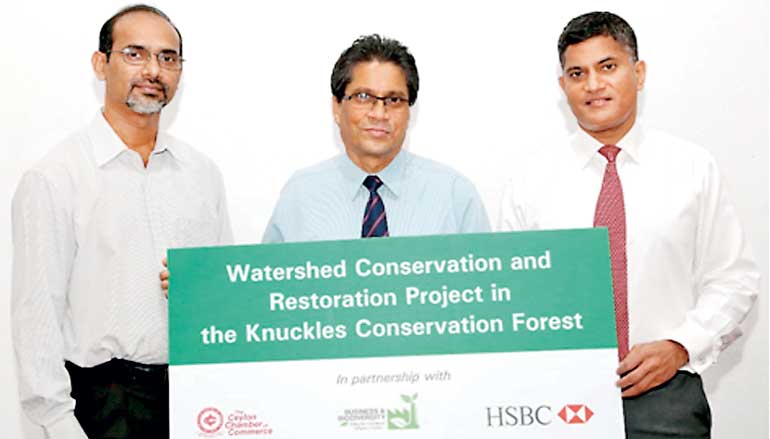Sunday Feb 22, 2026
Sunday Feb 22, 2026
Friday, 2 October 2015 00:00 - - {{hitsCtrl.values.hits}}
 From left: Shamen Vidanage – Program Coordinator, IUCN Sri Lanka, Mangala P. B. Yapa – Secretary General/CEO, Ceylon Chamber of Commerce (on behalf of the Sri Lanka Business and Biodiversity Platform) and Sriyan Cooray – Chief Operating Officer Sri Lanka and Maldives, HSBC Sri Lanka and Maldives
From left: Shamen Vidanage – Program Coordinator, IUCN Sri Lanka, Mangala P. B. Yapa – Secretary General/CEO, Ceylon Chamber of Commerce (on behalf of the Sri Lanka Business and Biodiversity Platform) and Sriyan Cooray – Chief Operating Officer Sri Lanka and Maldives, HSBC Sri Lanka and Maldives
Guided by the Forest Department, HSBC, together with the Sri Lanka Business and Biodiversity Platform of the Ceylon Chamber of Commerce (CCC) and IUCN, will begin working together on conserving and improving the mini watershed area of the Puwakpitiya Oya in the Knuckles Conservation Forest and Environmental Protection Area. This collaborative effort aims to enhance the biodiversity and ecosystem services of this area through the next three years in several stages.
The Knuckles Conservation Forest was declared a Conservation Forest by the Forest Department in 2000 and an Environmental Protection Area under the National Environmental Act, in 2007. The forest provides vital watershed services, important for socioeconomic development downstream. It also contains distinct biodiversity with over ten point-endemic faunal species already documented.
The Puwakpitiya Oya basin is an important highland area connected to the Moragahakanda irrigation development project. It also contributes significantly in securing habitats for point-endemic freshwater fish.
However, watershed degradation due to deforestation, agricultural land conversion and growing settlements is causing the depletion of water supply and springs upstream. A few of the anticipated positive outcomes of the project would be an improved watershed area with enhanced watershed functions, enhanced biodiversity and a better socioeconomic situation for the community.
The project will commence with an initial baseline survey in order to collect data on the ecological and socioeconomic status of the project area. On completion, attempts at rehabilitating the flora in the Puwakpitiya watershed area will commence.
Activities such as improving community-based eco-agriculture, improving natural forest protection within the Puwakpitiya basin and developing livelihood opportunities linked to agro-forestry products and sustainable eco-tourism are several key areas that will be addressed. The project will aim to empower communities and local conservation agencies in managing forest resources effectively for people and conservation benefits, through knowledge-based interventions.
A monitoring system will be developed to ensure the sustainability and continuance of the positive outcomes of this project.